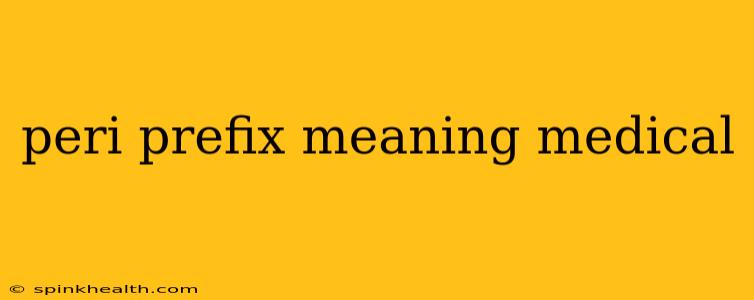The human body is a complex tapestry of interwoven systems, and understanding its intricacies is crucial for effective healthcare. Medical terminology, with its roots in ancient Greek and Latin, plays a vital role in this understanding. Today, we'll unravel the meaning and usage of the prefix "peri-," a common component in many medical terms that describes spatial relationships within the body. Our journey into the world of "peri-" will not only explain its core meaning but also explore its application across various medical fields, answering common questions along the way.
Imagine yourself as a medical detective, piecing together the clues hidden within medical terminology. The prefix "peri-" is your key to unlocking a deeper understanding of anatomical locations and conditions. Let's begin our investigation.
What Does the Prefix "Peri-" Mean in Medical Terms?
Simply put, the prefix "peri-" means "around," "surrounding," or "near." It indicates a location or relationship that's adjacent to or encircling a specific structure or area within the body. This seemingly simple definition holds immense significance in precisely describing the location of an ailment, injury, or anatomical structure.
Common Medical Terms Using the "Peri-" Prefix
The prefix "peri-" combines with various root words to create many important medical terms. Understanding the root word alongside "peri-" gives us a complete picture of the term's meaning. Here are a few examples:
- Pericardium: The sac-like membrane that surrounds the heart. "Peri-" indicating "around" and "cardium" meaning "heart."
- Perineum: The area between the genitals and the anus. "Peri-" indicating "around" and "-ne" referring to the anus and genitals.
- Periosteum: The membrane covering the outer surface of bones. "Peri-" indicating "around" and "osteum" referring to bone.
- Peritonitis: Inflammation of the peritoneum (the membrane lining the abdominal cavity). "Peri-" indicating "around" and "-itis" denoting inflammation.
- Periorbital: Relating to the area around the eye socket. "Peri-" indicating "around" and "orbital" referring to the eye socket.
Frequently Asked Questions about the "Peri-" Prefix
Now, let's address some frequently asked questions to further solidify our understanding.
What are some other medical terms that use the "peri-" prefix?
Many other terms use "peri-," each subtly altering its meaning based on the root word. These include: peripheral neuropathy (damage to nerves outside the brain and spinal cord), perianal abscess (an abscess around the anus), and perimenopause (the transitional phase leading up to menopause). The consistent thread is the implication of something being around or surrounding a specific area.
How is the "peri-" prefix different from other prefixes with similar meanings?
While "peri-" denotes proximity, other prefixes offer nuanced distinctions. For example, "para-" often suggests being alongside or beside, while "circum-" indicates encircling completely. The choice of prefix hinges on the precise anatomical relationship being described.
Can you give real-world examples of how the "peri-" prefix is used in a clinical setting?
A doctor might mention "pericarditis" when discussing heart inflammation, indicating the inflammation is around the heart. Similarly, a description of "periorbital edema" would pinpoint swelling surrounding the eye socket. The use of "peri-" in clinical settings ensures accuracy and clarity in medical communication.
Conclusion
Understanding the "peri-" prefix is a significant step towards improving your medical vocabulary and comprehension. By recognizing this prefix, you can readily interpret a wide range of medical terms, contributing to a better understanding of medical diagnoses and treatment plans. Remembering that "peri-" means "around," "surrounding," or "near" provides a powerful framework for deciphering its role in medical terminology. As you continue to explore the world of medical language, you'll discover that a solid grasp of prefixes like "peri-" is essential for clear and effective communication within the medical field.

